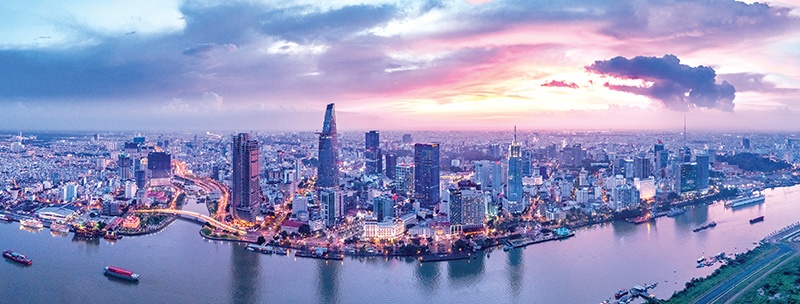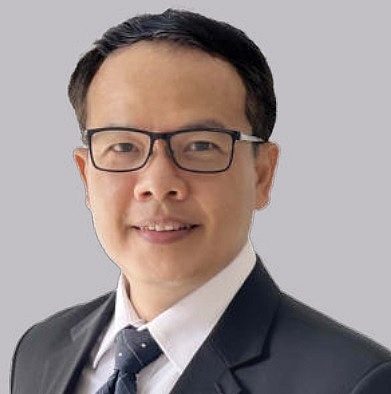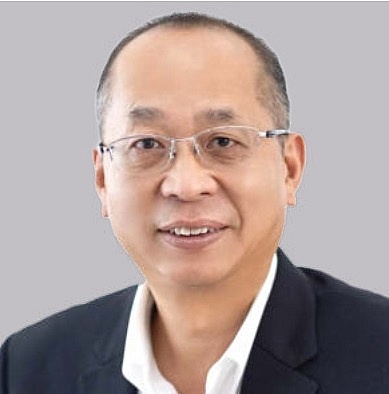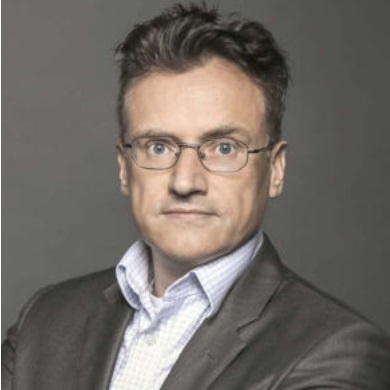Conditions ripe for long-term stays
 |
| Conditions ripe for long-term stays |
New moves by leading multinational corporations on additional investments to expand production in Vietnam are reflecting their confidence in Vietnam’s prospects for economic recovery, which in turn is opening up new chances for non-nationals to visit the country for the first time and, perhaps, stay for much longer.
Swiss corporation Nestlé earlier this month poured an additional $130 million into its facilities in this country, raising its total investment in Vietnam to $730 million, to carry out a number of projects over the next two years. Over the long run, Vietnam is flying high on Nestlé’s agenda as an international and regional manufacturing hub.
Elsewhere, Sweden’s Tetra Pak has pumped in $5.86 million to expand its existing multi-million-dollar plant in the southern province of Binh Duong, while South Korea’s LG Display has acquired an investment certificate for projects with added capital of $750 million in the northern port city of Haiphong.
The large chunk of high-quality investment not only demonstrates foreign investors’ trust in Vietnam’s strong economic recovery after the pandemic, but also opens up job opportunities for those yet to arrive.
The HSBC Expat Explorer Survey 2021 – a global survey of over 20,000 people living and working abroad published last week – showed that 83 per cent of expatriates in Vietnam are optimistic about living here for the next 12 months, anticipating a return to strong economic growth after the pandemic subsides.
This is similar to the rates in Australia and New Zealand, while Taiwan has a rate of 85 per cent. As many as 20,460 overseas experts based in 46 countries and regions were questioned in April and May this year.
Just over half of those surveyed in Vietnam said the local community has become more supportive of each other since the start of the pandemic, compared to 46 per cent globally.
Currently, Vietnam has an overall rank of 19th globally as the best destination for foreigners to live, up three places from 2020, although it ranks as the fifth-best location in the Asia-Pacific region.
HSBC believed that there is a growing sense of optimism among expatriates in Vietnam that with the vaccine rollout picking up pace, the country will return to a more normal existence.
“In Vietnam, this will mean a return to strong economic growth in a very vibrant and exciting country, where apart from the benefits of being in a fast-moving and vibrant economy, the country also offers a wide variety of geographies from mountains, jungles, and beaches to wonderful food and very hospitable people. As an expat living in Vietnam, I would not want to be anywhere else at this exciting time for the country,” an HSBC Vietnam representative said.
According to Dr. Greeni Maheshwari, lecturer at the School of Business and Management at RMIT University Vietnam, her family has felt safe staying in a country like Vietnam during the pandemic, as people have been provided with detailed, up-to-date information and advice. “In the past 15 years, my family has called Vietnam our second home. It has been amazing to see that whenever issues arise here, such as the avian flu in 2016, flooding in central Vietnam last year, or the various waves of the pandemic, the country always bounces back strongly,” she said.
Meanwhile, the Expat Insider 2021 survey published by InterNations in May saw Vietnam ranked first in both personal finance and cost of living indices, out of 59 countries. Around 85 per cent of expats rate the cost of living positively although the percentage globally is 48 per cent, and 78 per cent are satisfied with their financial situation, compared to 64 per cent for the rest of the world. Overall, Vietnam placed 10th out of the 59 nations surveyed.
Specifically, 9 per cent of expats in the country have an annual income over $250,000, while the average percentage for the globe is only 3 per cent.
As of April this year, Vietnam reported 101,550 non-nationals working in Vietnam – 12 per cent of who are in a managing position, 8 per cent in operating director roles, and nearly 60 per cent are classed as experts, according to the Ministry of Labour, Invalids and Social Affairs (MoLISA).
Foreign experts working in Vietnam currently come from 110 countries and territories. This labour force is mostly living in Hanoi (4,400 people), Bac Giang (4,600), Long An (5,600), and Ho Chi Minh City (27,000). But with this year’s complexities, many sectors are looking out for more help from abroad.
“There is an urgent demand for a high-quality foreign labour force in some major industries, such as construction and energy, due to the lingering pandemic,” the MoLISA stated.
Being aware of the utmost importance of the presence of foreign experts from elsewhere, Mary Tarnowka, executive director of the American Chamber of Commerce in Ho Chi Minh City, said that the government should continue to issue flexible policies and simplify procedures to license them to work in Vietnam.
“Loosening procedures for foreign experts to enter the country during the ongoing pandemic is considered an urgent requirement to help local manufacturers resume full operations,” Tarnowka said.
| Thue Quist Thomasen - Board member of EuroCham CEO, YouGov Vietnam
Despite the short-term shock of this fourth wave, the data shows that Vietnam’s long-term prospects remain positive. European business leaders are predicting maintaining or increasing their staff and investment plans – even in the midst of this current outbreak – which demonstrates a continued confidence in Vietnam’s trade and investment environment It is critical that Vietnam keeps a strong focus on creating the best possible conditions for foreign-invested enterprises as the country reopens. The successful investment of Hayat into Vietnam is a testament to the fact that conditions are improving. European businesses are sustainable, innovative and the best long-term partners for Vietnam. With the EU Vietnam Free Trade Agreement, Vietnamese consumers will get access to world class products while Vietnamese businesses will flourish from the access to the world’s biggest market. | |
| Chinoros Benjachavakul - Senior vice president Human Resources & Corporate Affairs C.P. Vietnam
After living and working in Vietnam for 17 years, I consider this country my second home. In 2004, C.P. Vietnam had 3,000 employees, but the figure is now currently 30,000 people. The expansion in employees is a result of the group’s growth and the introduction of expatriates like myself. I have occasion to travel around the country via business trips, and I am impressed with the beauty, culture, and food. You can meet friendly people and enjoy delicious dishes everywhere you go. I see the analogy in culture between C.P. Vietnam and the country, which involves solidarity and sharing and supporting each other. I would like to join more corporate social responsibility activities, especially blood donation, which is a precious act and also a responsibility of citizens. I believe I have the same responsibilities to this country as any Vietnamese national. | |
| Chung Wai Fu - General director Lee & Man Paper Vietnam Co., Ltd
I arrived in Vietnam in 2014 when the group had plans to build a paper mill in the Mekong Delta province of Hau Giang. This was because I wanted to challenge myself and it was an opportunity to realise my breakthrough ideas. I feel that Chau Thanh district of Hau Giang is similar to Hong Kong in terms of the environment, climate, and lifestyle of local people. The investment environment has improved thanks to the government’s reforms in procedures, making Vietnam a promising land for foreign investors. In Hau Giang in particular, Lee & Man and other foreign-invested enterprises receive good support and incentives from local authorities. Foreign investors’ trust in the investment environment is proved by the increase of 4.4 per cent in foreign direct investment capital inflow to the country so far this year. The figure will continue to increase if the country maintains flexible and effective pandemic prevention. | |
| Andreas Stoffers - Country director Friedrich Naumann Foundation for Freedom in Hanoi
When I first set foot on Vietnamese soil in 2009, the country had already cast its spell on me. I was able to follow the country’s economic growth with my own eyes and make my contribution as a banker for several years. Afterwards, as a professor of international management in Munich, I stayed in touch with Vietnam and was there several times a year for teaching and research. I feel very connected to the country. Vietnam is developing rapidly and is full of vitality. With strong economic growth, all those who take advantage of this rise are riding high on the momentum. You can feel the dynamism everywhere and can be pulled upwards with it. I have never regretted going to Vietnam and hope to live here for a long time. I want to continue to use the momentum of working in a booming economy and take advantage of my good career opportunities here. |
What the stars mean:
★ Poor ★ ★ Promising ★★★ Good ★★★★ Very good ★★★★★ Exceptional
 Tag:
Tag:
Related Contents
Latest News
More News
- Foreign leaders extend congratulations to Party General Secretary To Lam (January 25, 2026 | 10:01)
- 14th National Party Congress wraps up with success (January 25, 2026 | 09:49)
- Congratulations from VFF Central Committee's int’l partners to 14th National Party Congress (January 25, 2026 | 09:46)
- 14th Party Central Committee unanimously elects To Lam as General Secretary (January 23, 2026 | 16:22)
- Worldwide congratulations underscore confidence in Vietnam’s 14th Party Congress (January 23, 2026 | 09:02)
- Political parties, organisations, int’l friends send congratulations to 14th National Party Congress (January 22, 2026 | 09:33)
- Press release on second working day of 14th National Party Congress (January 22, 2026 | 09:19)
- 14th National Party Congress: Japanese media highlight Vietnam’s growth targets (January 21, 2026 | 09:46)
- 14th National Party Congress: Driving force for Vietnam to continue renewal, innovation, breakthroughs (January 21, 2026 | 09:42)
- Vietnam remains spiritual support for progressive forces: Colombian party leader (January 21, 2026 | 08:00)
























 Mobile Version
Mobile Version